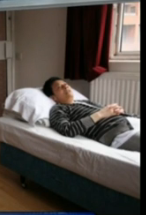Mr.CHEN lobbed to remove and promote both previous secretary of Xinmi communist committee and mayor of Xinmi City before end of 2008 because they used the gangster who attacked the Mifeng. the fail result was made danger if they use police to take over the MiFeng illegally. so the new secretary was named that subjected to take over MiFeng. the Police Mr. LIANG told my general Manager that i have been in the 'police wanted list' as QIU Ziming (http://english.caing.com/2010-08-05/100167153.html
The Suichang police posted the notice for detention on an internal government server. In standard criminal case investigations, arrest warrants are open to the public. But online warrants, used typically for public security bureau's internal server, are disseminated across the information systems of airports, hotels and all public security agencies. Qiu discovered the news from an insider.
but my arrest was much grave then QIU Ziming's. It was expended to every Chinese embassy in the world. once I got into the embassy, I would be arrested and removed to China.So why Chinese authority is very interesting on me than others and why they did not take legal procedure to arrest me because I hold plenty hard evidences such as voice record, videos and documents to be a wittiness of they are criminals.
Please see the following article to know how they breached china's law.
Investigative Journalism and the Chilling Effect
 One of the more interesting stories I’ve been following this week concerns a reporter who was placed on a police “wanted” list after writing an insider trading article. The incident obviously has eyebrows raised not only in the journalism community over here, but also for everyone interested in rule of law and abuse of power.
One of the more interesting stories I’ve been following this week concerns a reporter who was placed on a police “wanted” list after writing an insider trading article. The incident obviously has eyebrows raised not only in the journalism community over here, but also for everyone interested in rule of law and abuse of power.Here’s the background:
A Beijing-based business newspaper pledged Wednesday to stand firm in defending one of its journalists who became a fugitive from the law following his whistle-blowing investigative report of insider trading by a Shenzhen-listed battery manufacturer in east Zhejiang Province.This story is disturbing because:
Qiu Ziming, a reporter with the Shanghai bureau of the Economic Observer, found himself appearing on an online national list of wanted criminals as police in Suichang County in Zhejiang alleged that he was “damaging the business reputation” of local Kan Specialties Material Corporation, a charge Qiu denied.
A) This journalist was allowed to smear the reputation of a private company.
B) The newspaper continued to defend Qiu even after the police put him on the list.
C) A private company was able to use the police to bully a journalist.
I hope you chose ‘C’ because that is exactly what’s going on here. Until this evening, the police have been saying that this is all fine because obviously this reporter “defamed” the company by writing about the insider trading.It was nice to see that the Economic Observer stood by their guy, as they should have. ChinaGeeks has translated the EO response, which is worth a read.
Word came out several hours ago that the higher-ups in the police department looked into the case and determined that the local cops who instigated all of this were totally wrong:
So the police have rescinded the order, accepting the view that it “did not comply with the relevant laws”. They have also been ordered to apologise to Qiu and compensate him.This is nice to see, but I hope that this does not get put to rest as a case of “the cops made a mistake and are sorry” event. Do you think this is simply an “oops!” or was something more going on? It’s always possible that the local police had no clue that the law did not allow them to arrest a journalist for writing a story like this. But it’s just as likely (in my mind, more so) that the cops knew what they were doing and thought they could get away with it. I have no idea what was the relationship was between the company in question and the local police, but I certainly hope that it is thoroughly investigated.
Let’s take a page from U.S. Constitutional Law, which comes in handy now and again. The concept that immediately comes to mind here is called a “chilling effect,” which is defined as:
In constitutional law, the inhibition or discouragement of the legitimate exercise of a a constitutional right, especially one protected by the First Amendment to the United States Constitution, by the potential or threatened prosecution under, or application of, a law or sanction.What’s the big worry here? It’s not just stopping someone (like a journalist) from saying something or punishing them after the fact. That’s bad enough. What’s worse is the “discouragement” of future exercise of that right by other individuals by the “potential or threatened prosecution” by law enforcement.
In other words, I’m glad that Qiu is off the hook here and doesn’t have to worry about being thrown in jail. I’m happy that the police admitted that this was wrong and will apologize.
But I’m worried about a potential chilling effect on other reporters. You think this might embolden other companies (targets of investigative journalists) to use threats to quash stories? I guarantee it. Qiu is OK now, but he had a very tough few days. If I’m a journalist, I don’t want to experience this nightmare firsthand.
A State-level policy statement by the PSB, explaining why this should never happen again, would be the way to go here. Of course it won’t happen, but that would be the proper way to forestall any possible chilling effect.
